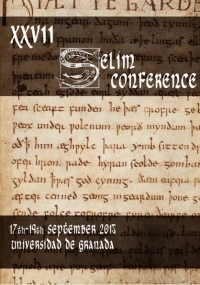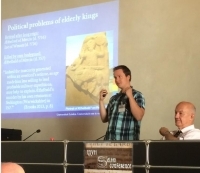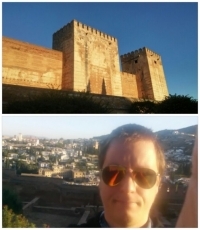Thijs Porck participates in the SELIM conference in Granada, Spain
From 17 to 19 September, the University of Granada organized the 27th International Conference of the Spanish Society for Medieval English Language and Literature (SELIM).
 Thijs Porck (LUCAS) presented a paper on his PhD-research and was invited to chair one of the sessions. His participation in the conference was sponsored by LUCAS and the Leiden University Fund/van Walsem.
Thijs Porck (LUCAS) presented a paper on his PhD-research and was invited to chair one of the sessions. His participation in the conference was sponsored by LUCAS and the Leiden University Fund/van Walsem.
Porck reports....
An inspiring, international conference
With over sixty scholars from fourteen different countries, the conference at Granada was definitely an international affair. The papers dealt with various aspects of medieval English, ranging from number symbolism in Anglo-Saxon literature to the linguistic analysis of topicalisation in Middle English, through to the reception of Old English charters in late medieval England, Middle English Arthurian romances and adaptations of Old English literature in the works by J. R. R. Tolkien.
Porck: "Two keynotes in particular proved to be stimulating. Tom Shippey (Saint Louis University) discussed at length the reception of a famous lecture by Tolkien in 1936 on the Old English epic poem Beowulf: it turns out that this lecture (which changed the direction of Beowulf scholarship ever since) has mostly been misunderstood. Leonard Neidorf (Harvard University) also discussed Beowulf and demonstrated the probability of metrical emendations that some editions offer. The modern idea that poets occasionally deviate from standard metrical patterns for aesthetic purposes should not be applied to the poets of the early Middle Ages: whenever a deviation from the regular pattern is spotted, a copyist must have made a mistake. This is an important observation that is relevant for the study and dating of Old English poetry and Beowulf in particular.
The conference certainly left me inspired and I am sure I can use many of the things I heard at the conference in both my research and teaching. It also confirmed that the study of medieval English is a blooming, international field. Fortunately and almost uniquely in the Netherlands, Leiden University has a rich tradition in the study and teaching of Old and Middle English: long may it remain so!"
Old kings in Beowulf
 Drawn to the conference because of the fact that two keynote speakers would talk about Beowulf, Porck presented a paper on the same poem. He explains: "I am currently writing my PhD-thesis entitled Growing Old among the Anglo-Saxons: The Cultural Conceptualisation of Old Age in Early Medieval England and, naturally, focused on the presence of old people in Beowulf. In particular, I proposed a new reading of the poem as a ‘mirror of elderly kings’.
Drawn to the conference because of the fact that two keynote speakers would talk about Beowulf, Porck presented a paper on the same poem. He explains: "I am currently writing my PhD-thesis entitled Growing Old among the Anglo-Saxons: The Cultural Conceptualisation of Old Age in Early Medieval England and, naturally, focused on the presence of old people in Beowulf. In particular, I proposed a new reading of the poem as a ‘mirror of elderly kings’.
Scholars have long since recognized that Beowulf offers many examples of good and bad rulership. What has gone unnoticed, however, is that most of these kings are well beyond their prime: they are all of an advanced age. I place the poem within an early medieval historical context, when elderly rulers faced a plethora of political problems. The Beowulf poet seems to comment on these problems specifically; hence, the poem may have been written for an old king. I made the case for King Offa of Mercia (d. 796) as the patron of the poem.
Presenting a paper on Beowulf is always exciting, since every scholar in the field is familiar with the poem. Moreover, issues concerning the theme and date of the poem always lead to passionate (and even heated) discussions. The discussion following my paper was no different, but, on the whole, people responded well and seemed to be genuinely convinced by my reading of the poem."
Chairing a session and exploring medieval Granada
 Since Porck knew one of the organisers of the conference (they had both attended a conference in Manchester, as well as a workshop in Dublin), he was asked to chair one of the conference’s sessions. Porck: "Having gained some chairing experience at the LUCAS Graduate Conference in 2015, I gladly accepted the responsibility to make sure that the speakers kept to the times allotted to them and then moderated the discussion afterwards. I would encourage all (early) researchers to volunteer to chair sessions at a conference: if anything, it is a good opportunity for networking. Another opportunity for making new contacts is the conference dinner, which for this conference took place during a flamenco show in the medieval Moorish district Albayzin.
Since Porck knew one of the organisers of the conference (they had both attended a conference in Manchester, as well as a workshop in Dublin), he was asked to chair one of the conference’s sessions. Porck: "Having gained some chairing experience at the LUCAS Graduate Conference in 2015, I gladly accepted the responsibility to make sure that the speakers kept to the times allotted to them and then moderated the discussion afterwards. I would encourage all (early) researchers to volunteer to chair sessions at a conference: if anything, it is a good opportunity for networking. Another opportunity for making new contacts is the conference dinner, which for this conference took place during a flamenco show in the medieval Moorish district Albayzin.
With the splendid remains of the Alhambra and its many late medieval churches, Granada is deeply rooted in its medieval past. Surely, this is every medievalist’s dream location for a conference! Every morning, I took a two-hour walk up some of the hills surrounding Granada to enjoy the views and visit the medieval abbeys and castles. However, while I appreciated the scenery and warm weather, I must admit I did not particularly enjoy having to eat dinner at 11 pm in the evening, nor am I a big fan of flamenco music. In this respect, I feel more akin to the culture of the (early medieval) North West."
